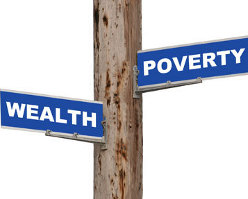Poverty: Why Should We Care?
 Should Christians work to relieve the suffering of poverty? Near the end of the 19th century, proponents of the social gospel proposed a new answer to that question.1 Part of their answer wasn’t new at all—the idea that Christians should help the poor and bring the gospel to them. But the social gospel effectively claimed that relieving suffering in the world is the gospel.
Should Christians work to relieve the suffering of poverty? Near the end of the 19th century, proponents of the social gospel proposed a new answer to that question.1 Part of their answer wasn’t new at all—the idea that Christians should help the poor and bring the gospel to them. But the social gospel effectively claimed that relieving suffering in the world is the gospel.
Naturally, Christians who understood their Bibles ran in the opposite direction, aiming to bring the true gospel into sharp contrast with this new distortion. But in the process, many eventually embraced an attitude of total indifference to the poor and, worse, became habitually hostile toward any organized Christian effort to fight poverty.
In recent years things have gotten messier yet. In their haste to reject unbiblical reactions to the social gospel, many evangelicals (and some fundamentalists) seem to be over-correcting (“anti-anti-social-gospelism”?). They are rejecting the central error of the social gospel while accepting other components of the social liberalism that bred it.2
This series aims to help readers recognize and properly reject not only the social gospel but also other errors that have become ubiquitous assumptions of our times.
So far, we’ve briefly considered three questions:
- What is poverty? (relative versus absolute poverty)
- Why are the poor poor? (a survey of the causes of poverty)
- Why shouldn’t the poor be poor? (why believers should fight poverty)
Discussion
Planned Parenthood report: abortions up by 8,270
Body
Discussion
Thinking Biblically about Poverty, Part 3: Why Shouldn't the Poor Be Poor?

Poverty is a bad thing in the eyes of most people—Christians included. But why do we see poverty that way? How we answer that question influences the kinds of things we do to try to reduce or relieve poverty. The why shapes the where, when and how.
So far in this series, we’ve considered briefly what poverty is (relative vs. absolute) and surveyed the causes of poverty in Scripture. We’ve assumed that poverty is a negative that should be reduced as much as possible wherever it exists.
But not everyone sees it that way. From the days of Benedict of Nursia to today,1 Roman Catholicism has included some who take vows of poverty, and many evangelicals teach that average Christians should increase their relative poverty in order to relieve others’ absolute poverty.2 A few imply that the relatively poor (all of us, compared to those who are richer) should become much more poor so that those who are relatively poorer than we are (“the needy around us”) can become less so.3
But Scripture provides reasons to view poverty as a condition we should avoid in our own lives as well as the lives of others.
A wrong reason
Before we consider some of the best reasons to fight poverty, we need to take one faulty reason off the table. Unfortunately, it may well be the most popular reason in the American mind today. The worst reason to fight poverty is, in a word, inequality.
Discussion
Thinking Biblically about Poverty, Part 2: Why are the Poor Poor?

If the cultural indicators are to be believed, the plight of world’s poor has become a topic of great interest in the west and America in particular. Advertising by non-profits abounds, rivaled only by the conspicuous relief efforts of major corporations. Even our fashion trends reveal a fascination with poverty.1 Wealthy celebrities and middle income Americans alike pay extra money for clothes that appear to already be worn out. Young pastors sport bed-head hairdos2 and preach in outfits carefully engineered to look like they’ve been slept in for a couple of days. Faux poverty is in.
So do we Americans want to relieve poverty or just imitate it? One thing is clear: we do not really understand it, and evangelicals seem to be about as confused as the general population. Efforts to help can only go so far if we’re unclear about poverty’s true nature and causes, so we need a deeper understanding.
Part 1 of this series focused on the question, What is poverty? That essay stopped well short of fully answering its title question but emphasized the importance of distinguishing between relative poverty and absolute poverty. Here we’ll focus on another question. But since this question is so intertwined with the first, we’ll chip away a bit more at the “what” along with the “why.”
Why, then, are the poor poor? Or, more precisely, what causes the poor to be poor?3
A biblical survey
Scripture reveals a great deal about the causes of poverty. A brief survey is possible here. I’ll group the causes of poverty under three headings, disaster, oppression and character, then draw some concluding observations.
Discussion
Thinking Biblically about Poverty, Part 1: What is Poverty?

Why are the poor poor?
It seems few are asking this question anymore—just when we need most to be asking it, just when interest in helping the poor has apparently reached an all time high.
I don’t recall ever hearing and seeing so many radio and TV ads for charitable causes, donation displays at retailers’ cash registers, or businesses prominently displaying how they’re helping the needy (or how they’re saving the world from environmental catastrophe—or both).
Evangelicals seem to be giving poverty more attention as well—in increasingly passionate terms and from quarters not historically known for that emphasis. Witness this observation from Southern Baptist, David Platt:
Meanwhile, the poor man is outside our gate. And he is hungry…. We certainly wouldn’t ignore our kids while we sang songs and entertained ourselves, but we are content with ignoring other parents’ kids. Many of them are our spiritual brothers and sisters in developing nations. They are suffering from malnutrition, deformed bodies and brains, and preventable diseases. At most, we are throwing our scraps to them while we indulge in our pleasures here….
This is not what the people of God do. Regardless of what we say or sing or study on Sunday morning, rich people who neglect the poor are not the people of God. (Radical: Taking Back Your Faith from the American Dream, p.115)

Discussion